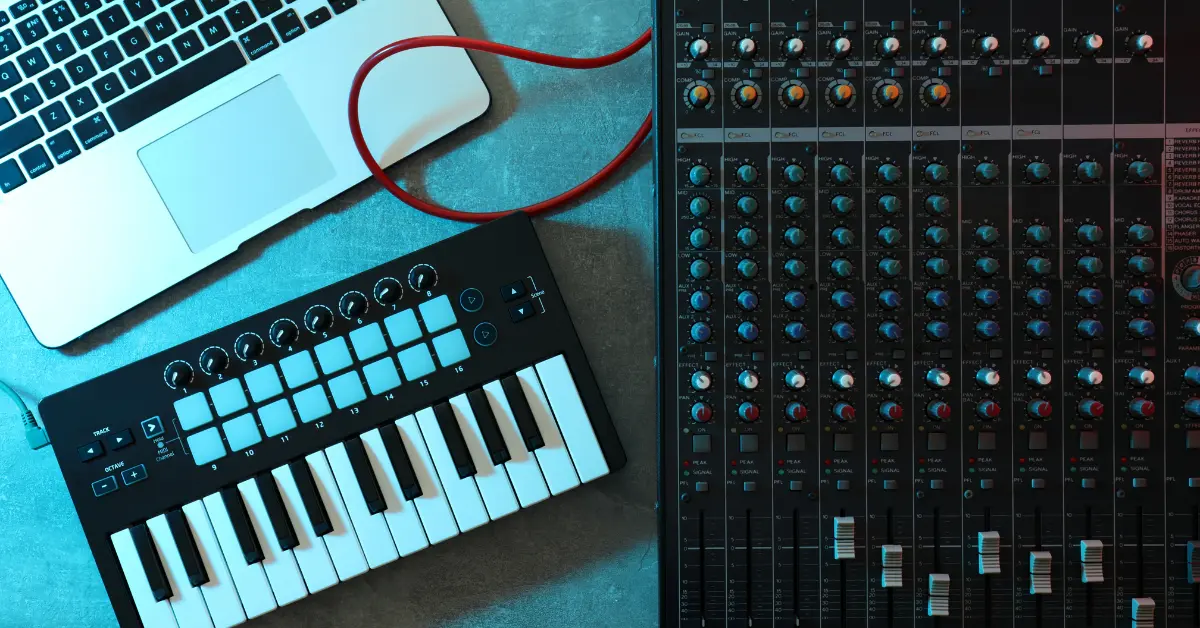The Ultimate Showdown – Private Vs Group Music Lessons
Ever stood at the crossroads of a musical journey, wondering which path to take? That’s exactly how it feels when deciding between private vs group music lessons. Do you crave the undivided attention and personalized feedback that private sessions offer or does your heart yearn for the camaraderie and social experience in group settings?
The decision isn’t as simple as picking out your favorite tune. It can set the tempo for your entire learning process, shaping not just your skill set but also your personal growth.
In this dance of notes and melodies, every step counts. Stay tuned – we’re about to dive into an ensemble of insights that will help strike a chord with smart parents seeking to enrich their children’s lives through music education.
Understanding Private and Group Music Lessons
If you’re ready to embark on your musical journey, it’s essential to understand the different types of music lessons. Whether private or group, each has its unique benefits that cater to various learning styles.
Private music lessons, like those offered at Sloan School of Music, give students one-on-one time with their teacher. This format allows for personalized attention which can lead to progressing faster as any bad habits are quickly identified and corrected by the experienced instructor.
The beauty of this setting is in how tailored tutoring meets individual needs. A piano lesson could be adjusted according to a student’s skill set, helping them improve specific techniques or delve deeper into certain aspects they enjoy about playing music.
In contrast, group music classes bring together peers interested in learning similar instruments or skills. These provide an engaging social experience that often fosters motivation among learners while enhancing their ability to play well with others – literally.
A key advantage here is that these sessions allow for more personal growth outside the specific instrument training because students learn from both their teachers’ instructions and observing fellow classmates’ progressions and challenges.
The Unique Value Each Setting Provides
You might ask: “Which type of lesson should I choose?” The answer isn’t straightforward since both offer value but in different ways depending on what a learner seeks from their lessons.
An important fact about private tuition is that it typically costs more per hour than group settings due mainly because of the undivided attention received during sessions; however, if focused improvement on a particular instrument is your goal – then this may prove invaluable.
Group lessons, on the other hand, offer a less costly option. They may not allow for the same level of individual attention or control over pacing and content but do provide an interactive learning environment that many students find enjoyable and beneficial.
A Balanced Approach
In the end, it all boils down to figuring out what suits you best as a learner. Private and group music lessons both have their merits in shaping one’s musical journey – finding the right balance is key.
Key Takeaway:
Deciding between private and group music lessons depends on your personal goals, learning style, and budget. Private lessons offer personalized attention to correct habits quickly and tailor teaching to individual needs. Group classes create a social learning environment that fosters motivation among learners while enhancing teamwork skills. It’s all about finding the right balance for you.
Benefits of Private Music Lessons
If you’re on the fence about whether to choose private music lessons, consider this: these sessions are all about you. Let’s dig into some of their major perks.
The Personal Touch in Private Lessons
One key benefit is the personalized feedback. Having a personal instructor to provide tailored feedback can be invaluable in the pursuit of musical mastery. It’s like having your own personal guide on this amazing musical journey.
This tailored approach also allows for flexibility that isn’t always possible in group settings. You aren’t tied down by a predetermined lesson plan – instead, what you learn and how quickly you progress is based entirely on your unique skill set.
Advancing at Your Own Pace
In private music lessons, there’s no need to keep up with others or feel left behind; it’s just you setting the tempo. Whether you’re mastering piano keys or strumming guitar strings, progressing faster becomes much more feasible when receiving undivided attention from an experienced teacher who understands your pace.
Students often meet their personal goals sooner due to consistent progression facilitated by these classes. And that sounds like sweet music indeed.
“Private music lessons provide individualized instruction tailored to the student’s needs.”
Advantages of Group Music Lessons
Group music classes have their own unique set of benefits. They not only teach you to play an instrument but also let you experience the joy and excitement that comes from making music with others.
The Social Aspect of Group Classes
Making music in a group setting isn’t just about learning scales or mastering chords. Connecting with others who possess a common enthusiasm for melody and rhythm can be an enriching experience. Music lessons taken in a group format allow students to engage socially, learn from each other’s strengths, correct mistakes together, and form ensemble skills which can be extremely beneficial.
This interaction offers more than just camaraderie; it provides motivation too. Students frequently experience a sense of connection when they observe their peers tackling the same struggles, such as getting that intricate guitar riff just right or honing a piano arpeggio.
Another key advantage is that these social interactions can lead to better communication skills outside class as well.
Learning Ensemble Skills in Groups
In addition to social perks, group classes are excellent platforms for developing ensemble skills. These lessons give aspiring musicians opportunities to harmonize melodies and synchronize rhythms – critical abilities if you’re eyeing a spot on stage someday.
Beyond this practical aspect though lies another benefit: listening. By playing alongside fellow students, young learners develop an ear for pitch variations and timing differences – crucial elements if one hopes to blossom into a skilled musician.
To sum up, choosing between private versus group music classes depends largely on personal preference and specific goals. But remember – both formats offer rich rewards on your musical journey.
Factors to Consider When Choosing Between Private and Group Lessons
When it comes to choosing between private and group music lessons, there are several factors you should consider. The choice can greatly impact your musical journey.
Assessing Your Learning Style
To make the best decision, start by assessing your learning style. Some individuals benefit from a more solitary approach, while others flourish in the excitement of working together. Private music lessons provide an environment where specific skills can be honed with focused attention from the teacher.
If you have personal goals that require specialized instruction or need help crafting a lesson plan tailored just for you, then private piano lessons might be more beneficial.
The Cost Factor
The cost is another key factor when deciding which type of lesson suits you best. On average, private lessons cost more per hour but offer undivided attention and customized guidance.
In contrast, group classes usually come at a lower price point due to shared resources among students learning together.
Note: while cheaper doesn’t always mean lesser quality, group music lessons may not allow for progressing as fast as individualized teaching does because the teacher’s attention is divided among all participants.
Your Personal Comfort Level
Last but not least: comfort level. It’s crucial that students feel relaxed enough to ask questions during their sessions. If being part of student peers gives you confidence or if having someone else around who might ask something similar helps put your mind at ease – then maybe give group settings some serious thought.
On the contrary, if you’re looking for a more secluded learning atmosphere where you can get quick responses without having to stress over other students – private lessons may be exactly what you need.
In conclusion, understanding these factors will help smart parents and learners make an informed decision that fits their needs. So weigh all the pros and cons before taking a leap into the world of music education.
Key Takeaway:
When choosing between private and group music lessons, assess your learning style, budget, and comfort level. If you thrive on focused attention and customized instruction for personal goals, consider pricier private lessons. However, if peer interaction boosts your confidence or eases nerves while offering a cost advantage – group sessions could be the way to go.
Private vs Group Music Lessons: A Comparison
The world of music education offers many choices, but the big question is whether private or group music lessons. Each has its perks and challenges. Let’s dig in.
Cost and Learning Pace
When it comes to cost, private lessons typically charge more per hour. But you get what you pay for – individual attention that lets students learn at their own pace. This one-on-one time often leads to progressing faster because the teacher can focus solely on one student’s needs.
In contrast, group classes are generally cheaper. Yet they might not provide the same rate of progress due to varying skill levels within a class affecting the learning process. Teachers have less control over pacing as they need to cater to all learners’ abilities simultaneously.
Social Interaction and Skill Development
A strong point in favor of group settings is social interaction. Students learning together develop ensemble skills – an essential part of playing music with others – by listening to their peers play music and receiving feedback from them too.
Sloan School of Music highlights that private lessons offer a tailored approach that helps improve specific techniques quickly thanks to undivided attention from qualified teachers who ensure bad habits don’t creep into your practice sessions.
Beyond Just Playing An Instrument
Taking up any musical instrument is also about personal growth alongside developing musical skills. Private students may find this aspect slightly lacking compared with those enjoying the camaraderie in a group setting. But, this doesn’t mean private lessons don’t offer any social experience – it’s just different.
Ultimately, choosing between private and group music lessons boils down to your learning style, goals, budget, and the specific instrument you want to master. Both formats have their strengths – one size does not fit all when it comes to learning music.
Key Takeaway:
own way. Both private and group lessons have their perks, right? Private ones let you progress quicker because of the personalized attention, but they might be a bit pricier. Group classes, though cheaper, give you a chance to learn from your peers and hone ensemble skills. So it all comes down to what fits your budget, learning speed preference, social interaction style, and overall goals best.
Private Music Lessons for Young Children
When it comes to musical education, young children can significantly benefit from private music lessons. Why so? The reason is quite simple – they get the entire lesson’s worth of one-on-one attention.
In a Sage Music article, studies show that learning an instrument can make you smarter. It boosts cognitive skills and promotes personal growth in children. This progress multiplies when kids receive individualized attention.
The Magic of One-On-One Attention
You see, during private lessons, the teacher tunes into your child’s unique skill set and adjusts their teaching style accordingly. Whether it’s piano lessons or violin training, this personalized approach allows them to address specific areas where your child might be struggling.
This undivided attention also lets teachers nip any potential bad habits in the bud before they become ingrained practices. Imagine having someone guiding every note played by your little Mozart.
Why Private Over Group Classes?
Group classes certainly have their charm – social interaction being topmost among them – but young minds need more focused guidance while navigating their early musical journey.
If we’re talking numbers here: consider a class with ten students versus one-on-one instruction; each student only gets 1/10th of the teacher’s attention in group settings compared to full dedication in private sessions.
Your kiddo could very well enjoy music classes with peers; however, there are chances that they might feel lost amidst all those notes floating around or develop bad habits unnoticed by even experienced teaching professionals due to divided focus.
Making Progress Faster
Private lessons offer a learning environment that is tailored to the student’s pace. If your child picks up melodies quicker than their peers, they can progress without waiting for others.
This kind of personal attention leads to students learning and progressing faster – something every smart parent would want for their kids.
Key Takeaway:
Private music lessons offer young learners a unique edge, with one-on-one attention that’s tailored to their pace and skills. This personalized teaching can help nip bad habits in the bud early on and boost cognitive growth more than group classes. Though group sessions provide social interaction, they may not give your child the focused guidance needed for fast progress in their musical journey.
How to Choose the Right Music Lesson Format for You
Selecting the right music lesson format can be tricky. It’s about balancing your personal goals, specific skills you want to develop, and how you best learn.
Your Personal Goals Matter
The first step is identifying your musical objectives. Do you wish to master a particular instrument or just enjoy music in general? Private lessons offer specialized instruction which could help if you’re aiming at mastering an instrument.
However, if your goal is more towards enjoying music as a hobby or building social connections while learning something new, group classes might be more up your alley.
Consider Your Specific Skills
If there are certain techniques or aspects of playing that you need special attention with – private lessons could give focused guidance on these areas. A qualified teacher from Sloan School of Music, for instance, can provide individualized feedback based on where improvement is needed most.
In contrast, group settings may not allow such tailored tutoring but they do let students learn by observing their peers’ strengths and weaknesses – a valuable insight into different approaches to mastering musical skills.
Determine Your Learning Style
This one’s crucial. Some people learn better when given undivided attention in a one-on-one setting like private classes offer; others thrive in collaborative environments where peer interaction fuels their progress – think band rehearsals.
A Quick Comparison Table: Group vs Private Lessons:
| Private Lessons | Group Classes | |
|---|---|---|
| Pace of Progression | Faster (due to undivided attention) | Varies (based on group dynamics) |
| Social Interaction | Limited | Richer due to peer learning and ensemble skills development. |
| Pricing | Typically Higher | Typically Lower |
Find Private and Group Music Lessons at Sloan School of Music
Deciding between private vs group music lessons can feel like playing a complex symphony. But, with the right notes in hand, you’re set to hit all the high keys.
You’ve learned that private classes offer tailored learning experiences and help students progress at their own pace. They provide undivided attention from an experienced music teacher – a boon for mastering specific skills.
On the flip side, group settings infuse social interaction into your musical journey. It’s where ensemble skills bloom amidst student peers while providing affordability not often found in one-on-one sessions.
In essence? Both formats have unique strengths – aligning them with your personal goals is key.
So go ahead; strike a chord with either choice as both are capable of conducting incredible growth on your path to becoming fluent in the language of melodies! Contact Sloan School of Music today!
Source link






